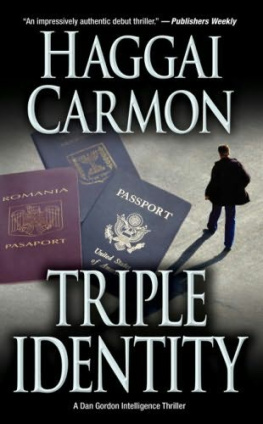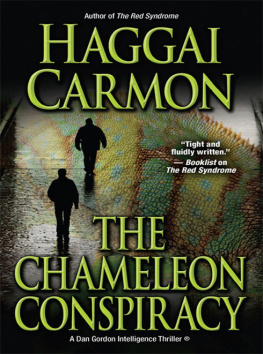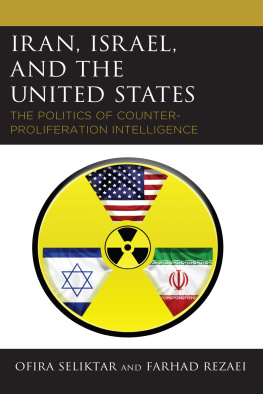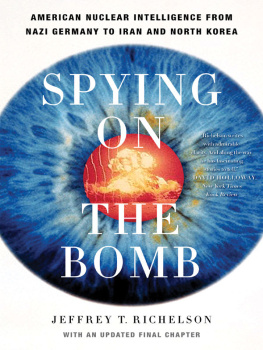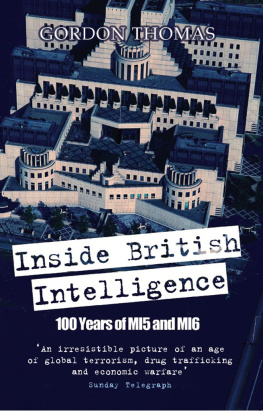ACKNOWLEDGMENTS
T his novel was written because one night jet lag won. In a small hotel in a remote country, after rolling from side to side for two hours, I finally gave up trying for slumber, went to the small desk, and turned on my laptop. The words that poured out had been lodged in my mind for some time. Obviously, in my years working for the U.S. Department of Justice I could not share the spine-tingling aspects of my work with anyone but my supervisors, and some adventures not even with them. Sadly, these events, which are sometimes more intriguing and thrilling than the best fiction I have ever read, are buried in reports submitted throughout the years. The story of Dan Gordon and his battle against the invisibles is my idea of the next-best thing. Many of my friends and family members read the first drafts and encouraged me to continue, particularly Dr. Jacob Dagan and Prof. Yehuda Shoenfeld. I would like also to thank Bob and Gloria Blumenthal; Alexandra Margalit, for helping me with the minute details of Munich that had escaped me; and Ed Watts. Sarah McKee proved to be not only an astute lawyer but an excellent reviewer who helped me describe the red-taped insides of the Justice Department, from which, as an outside consultant, I'd largely been spared. Many thanks to David Epstein, once my supervisor and mentor, now a very dear friend, who knew with immense wisdom and experience when to let me rush forward and when to shorten my leash. He called me a pit bull I never knew if he meant it as a compliment, because a pit bull finally lets go. A friend from the Mossad who wishes to remain anonymous helped me put things into perspective. Marc Jaffe helped me turn a manuscript into a novel, and Nicola Smith was my patient but relentless editor. Alan Lelchuk and Chip Fleischer are old and new friends who made this book a reality.
My in-laws have always been concerned with my safety, my sister shares that fear, and my wife, daughters, and sons are my best and worst critics. My daughters spent many hours reading drafts and making corrections, and I know how difficult it was for them to be introduced to the far and dark side of my work. My wife also endured the nonfictional tension of my long absences. Many of the hours I spent writing this book were taken away from my family, and my gratitude for their sacrifice is eternal.

FOREWORD
T errorism has no borders, no authority, no laws, no territory, and no moral considerations. Nothing stands in its perpetrators ways. Terrorists regard disastrous and devastating consequences as achievements, not failures. They turn their own military weaknesses into strategic might. What good are tanks, missiles, submarines, or nuclear weapons when a determined handful gets access to substances that can kill millions? Many leaders and scientists believe that it is only a matter of time before bioterrorism strikes, causing thousands of casualties.
Bioterrorism uses pathogens, bacterial and viral agents, or biologically derived toxins against people, livestock, or crops. Through the spread of these agents, terrorists seek to inflict massive fatalities. Unlike nuclear weapons, bioterror weapons are relatively easy to make, and unlike chemical weapons, only small amounts of biomaterials are sufficient to wreak havoc.
Is the world ready? I have had the privilege of preparing Israel for the task: As Israel's deputy minister of defense, I took the initiative to make bioterrorism issues a priority in Israel's strategic defense. My communications with other governments led to the realization that many were ill prepared for the prospect of bioterrorism. It is essential for the governments of the free world to develop, test, and implement public policies and operating procedures regarding bioterrorism. The scientific community also needs to be vigilant on this key matter by actively engaging in research to develop countermeasures.
Haggai Carmon has crafted a fictional but all too real tale. It takes place in the clandestine world of bioterrorism, where sinister plots are intertwined with money-laundering schemes. In the book, cooperation between the Mossad and the CIA is all that stands in the way of bioterrorism. By combining keen knowledge of the real-world situation, gained through his personal experience, with a vivid imagination, Haggai Carmon manages to draw the reader's attention to the real risks our modern society faces. This book provides a public service by raising awareness of terror financing and bioterror. What is remarkable is that it does so while telling a damn good story I couldn't stop reading.
EFRAIM SNEH, M.D .
Dr. Sneh is a member of the Knesset, Israel's parliament. During his military service as a medical doctor, he commanded the medical team of Israel's forces that rescued the hostages from their terrorist captors in Entebbe, Uganda. In 1981-82, as brigadier general, he was the commander of the Israeli armed forces in southern Lebanon; in 1985-87 he served as the head of the West Bank's civil administration. Dr. Sneh was elected to the Knesset and served as member of the Knesset's Defense and Foreign Relations Committee, as deputy minister of defense under Yitzhak Rabin, as minister of transportation, and as minister of health. He is currently serving in several Knesset committees, and chairs the subcommittee for Israel's defense strategy.
T he prisoner in the red jumpsuit was visibly nervous. He couldn't hide the subtle tremor in his left hand, which gripped a cigarette. He was very thin. Stammheim, the maximum-security prison in Stuttgart, Germany, where Andreas Baader and Ulrike Meinhof had been found dead in their cells in the 1970s, didn't exactly serve gourmet food. Even so, Igor Razov was too thin, as if consumed from the inside. His mustache had nicotine stains, as did his uneven teeth.
Good morning, I said, entering the visitor's cell and setting down my briefcase, which contained only a yellow pad. The less you carry into the prison, the faster the security check goes. I decided to be as polite as I could, to distinguish myself from this man's interrogators. I'm Dan Gordon from the U.S. Department of Justice. I'm here with the consent of your lawyer, Dr. Bermann. I looked at his lawyer, then at the court-approved interpreter, a heavyset, thirty-something woman who sat quietly in a corner opposite the German prison guard. Dr. Bermann nodded. No wonder he'd approved; I'd paid him five hundred dollars for the honor and promised an additional thousand if his client would give me the information I needed. It was Bermann's only way to get some real money for representing Razov, having helped him avoid extradition from Germany to Belarus, his homeland. There, Razov would have had to face the hangman, following a conviction in absentia for murder. I'd paid, and now the floor was mine.
I'm sure your lawyer has already told you, but to avoid any misunderstanding I must reiterate that I am not in a position to make any promises concerning your extradition to Belarus or the death penalty you're facing there if you are indeed extradited. The United States is not a party to the legal proceeding against you; your case is entirely in the hands of the German and Belarus courts and governments.
I spoke in English. Bermann had assured me earlier that Igor had learned rudimentary English in Minsk, and had then improved it while living in New York these past few years. Bermann and Igor communicated in English, because Igor didn't speak German and Bermann didn't speak Russian or Belarusian. Bermann had brought in the interpreter, Oksana, as insurance, in case of a failure of communication.

